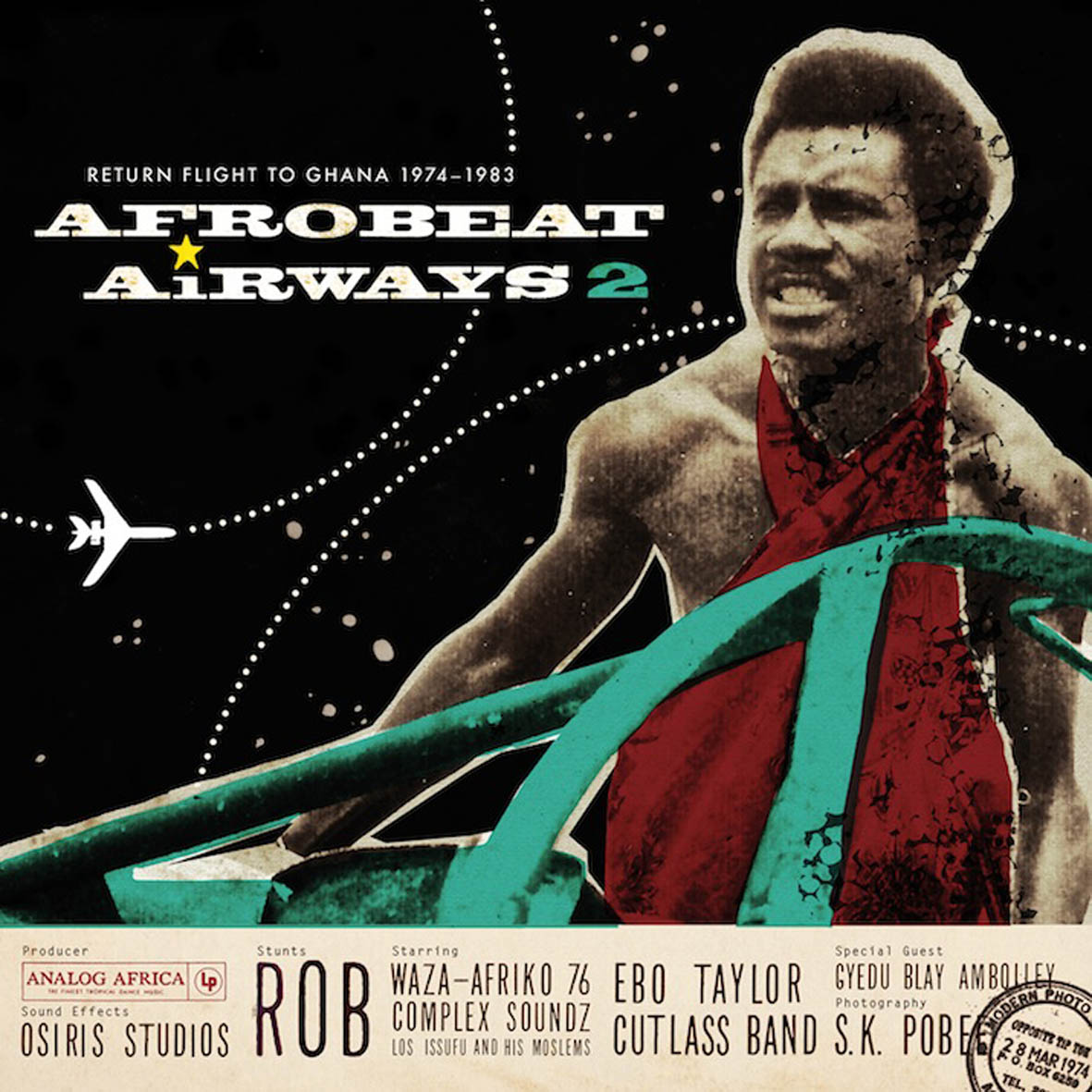
This sequel to 2010's fine Afro-Beat Airways delivers still more Fela-free gems from Ghana's golden age, which is (of course) is exactly what I wanted and expected.  While many of the featured artists (Vis-A-Vis, K. Frimpong, etc.) will already be quite familiar to anyone with even a casual interest in African music reissues, the material is uniformly solid and offers enough obscurities to keep things interesting.  Even the most jaded aficionados will enjoy Samy Redjeb's characteristically colorful and exhaustive liner notes though, as he has unearthed a slew of rare photos and tracked down some interesting interviews with a lot of people who probably never expected to be interviewed by an excited German in 2013.
By now, the "Analog Africa compilation" aesthetic is a very well-established formula, and Redjeb wisely does not mess with it for Afrobeat Airways 2.  Occasionally, Samy will surprise me with something completely amazing like last year's Diablos Del Ritmo, but most releases just offer up a generally likable batch of songs rescued from obscurity mingled with a handful of legitimately great ones that I wind up listening to in fairly heavy rotation for months (or years) afterward.  Nearly all of those gems this time around predictably come from the usual suspects, like Uppers International's stuttering, darkly funky "Aja Wondo" and K. Frimpong's lurching, understated "Abrabo" (a piece sans his Cubanos Fiestas that I have not heard anywhere else).  And, of course, the ever-reliable Rob delivers yet another predictably lascivious delight ("Loosen Up Yourself").  Also, while I was previously unfamiliar with Pierre Antoine (whose "Say Min Sy Soh" is probably the album's highlight), he is backed by the awesome Vis-A-Vis, which explains everything.  Actually, Vis-A-Vis are also the uncredited backing band for the K. Frimpong song, so they more or less steal the show on this compilation.
Music aside, what makes Analog Africa compilations so unique and special is their lavish and exhaustive liner notes and Afrobeat Airways 2 boasts some of Redjeb's best work, as Samy seems to have been in an uncharacteristically poetic and reflective mood.  For example, he summarizes the abandonment of horn sections for synthesizers, drum machines, MIDI, and computers thusly: "The harvest of this dispassion is three decades of sonic mediocrity."  He also tours the former site of one of the scene's hottest clubs (since converted to a church) and notes "I was shown around by a kind gentlemen who was trying to convince me that there were an infinite number of paths to accept Jesus as my personal savior. Little did he know that my 'saviors' had left the stage many years ago."  On a related note, it was morbidly fascinating to learn that the entire scene was essentially killed by a government-instituted curfew, a decision that more or less forced every relevant musician in Ghana to pack their bags and head elsewhere.
The real coup for this compilation, however, is that Redjeb was able to get access to the archives of Modern Photo, whose somewhat disinterested proprietor let him sort through boxes and boxes of forgotten negatives that had narrowly survived a flood.  Many of those photos are included in the booklet and some of them quite wonderful, particularly one of Fela Kuti exiting a plane with his entire female entourage, though I also enjoyed all of the Boogaloo competition shots.  Even the less spectacular aspects of the liner notes are endearing though–even though guitarist Sammy Cropper's interview yielded the usual litany of names, dates, and places, it was life-affirming that Redjeb went through the trouble to track down an aging school security guard to tell him that he is regarded as a guitar god and that people are excitedly trying to track down forgotten recordings that he made four decades ago (I am perhaps getting a bit sentimental in my old age).
Overall, this is a much better than average Analog Africa collection: it is not quite essential, but it should disappoint absolutely no one.  Aside from the songs mentioned above, there are quite a few other strong moments, particularly Waza-Afriko 76's "Gbei Kpaka Hife Sika."  Such a high success rate is surprising for an Afrobeat compilation, as the genre has historically been plagued by wild excess and indulgence–to Redjeb's credit, very little of that surfaces here, as most songs are under five minutes and few are even under three(!).  Even the few songs that I do not particularly like (Tony Sarfo's American funk pastiche and De Frank's repetitive, sing-songy "Waiting For My Baby") are appealing enough to avoid being dismissed as mere filler.  Of course, the music is only part of the picture in this case, which is why Analog Africa compilations are so great: Afrobeat Airways 2 is basically yet another important chapter in a lovingly assembled crash course in African culture and history taught by one singularly enthusiastic crate-digger.
 
 
Read More

